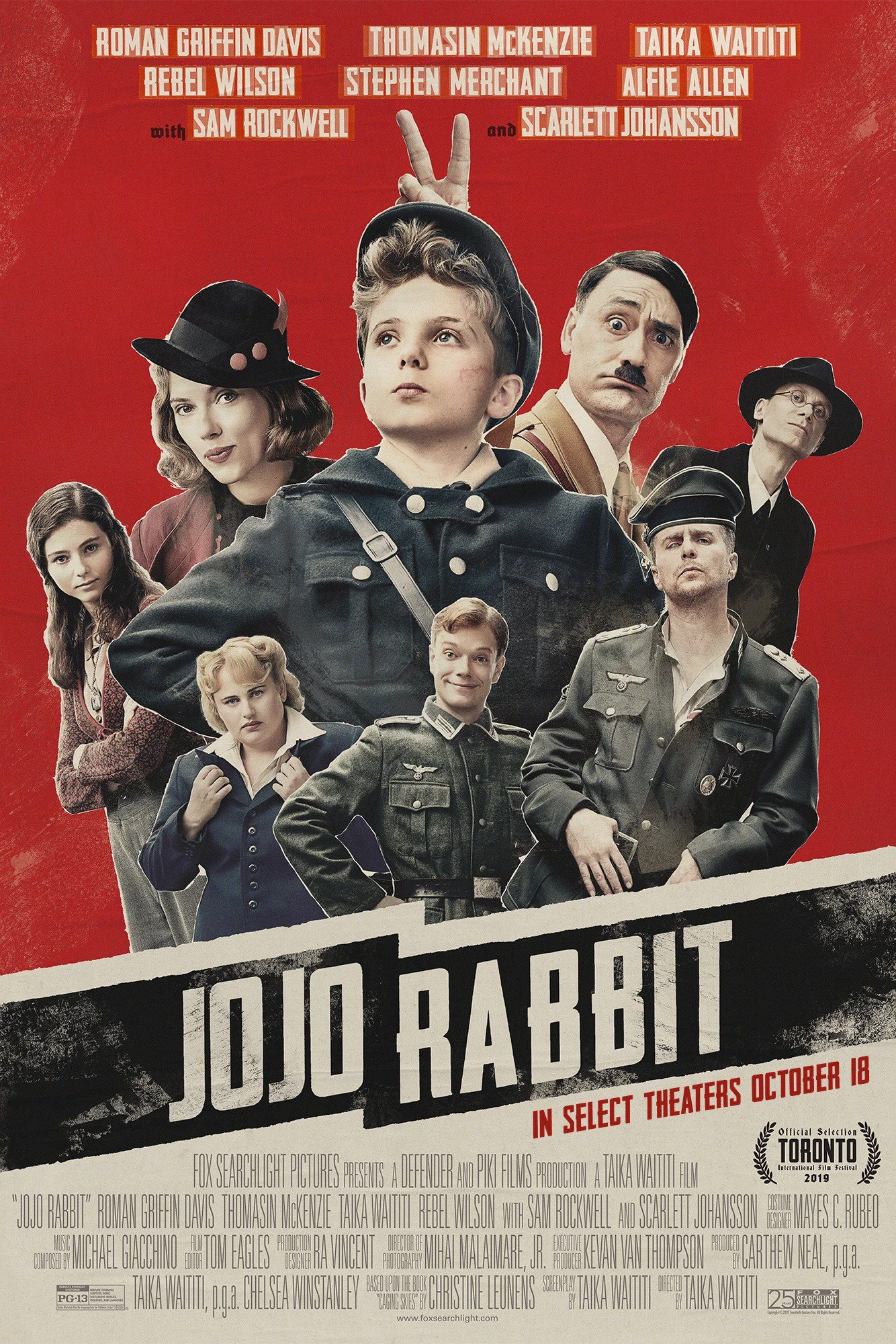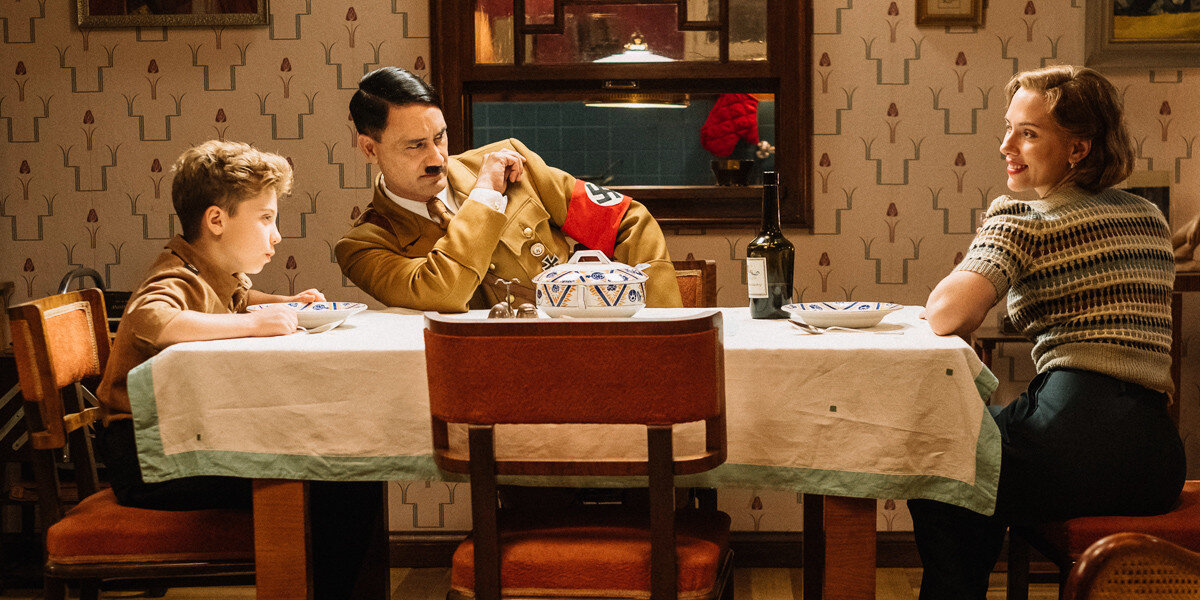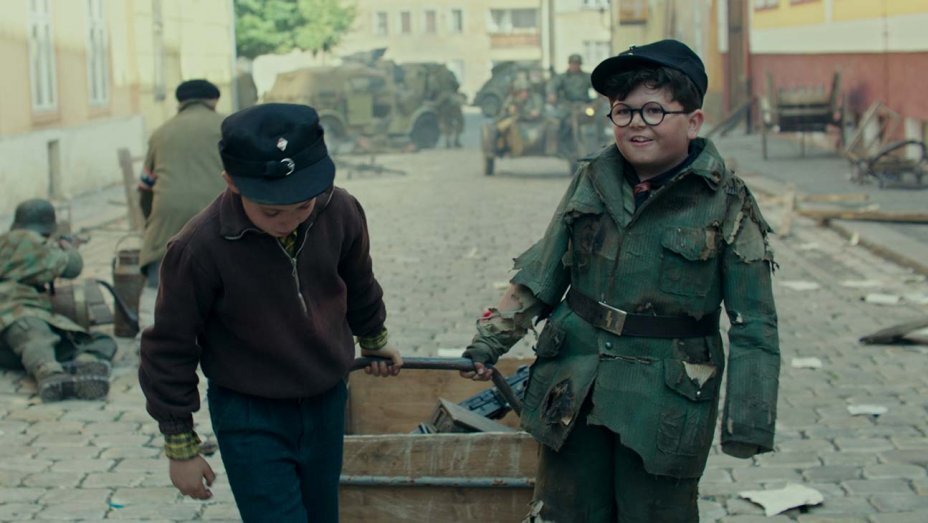Jojo Rabbit
- A funny and touching deconstruction of Nazi ideology through the eyes of a young boy.
Full Disclosure: There are a few subjects that you’re not supposed to joke about – Nazis being one of them. Although there are some examples of Nazis being used for comedic purposes in movies, in most cases if you’re trying to make jokes about Hitler, you should just stop. So, I was a little wary going into the movie about how the subject matter would be treated.
Review
Taika Waititi is at the top of his game right now. His 2014 vampire comedy What We Do in the Shadows was recently turned into a TV series, he delivered one of the most beloved and original movies in the Marvel Cinematic Universe in Thor: Ragnarok, and he’s directed one of the episodes of the upcoming and highly anticipated Star Wars series The Mandalorian.
Basically, in basketball terms, Jojo Rabbit is like Waititi’s heat check. If he could make a comedic movie about a young boy and Hitler, there would seem to be very little he can’t do. This is often the moment when a player will clank one badly off the side of the rim. However, I’m happy to say that Waititi didn’t miss. He delivered an excellent movie where the comedy hits, and the sentimental moments are genuinely moving.
Jojo Rabbit is about a young German boy during the last stages of WWII. Jojo’s bedroom walls are adorned with swastikas, he is an enthusiastic member of the Hitler youth, and engages in lively conversation with, and receives inspiring pep talks from his imaginary friend, Adolf Hitler (played by Waititi). The war is not going well for the Germans, however, and Jojo’s life is really thrown upside down when he discovers a young Jewish girl named Elsa living in his walls, being hidden there by his mother.
We can all guess more or less where the story goes from there. Jojo doesn’t turn the girl in for fear that his mother will be punished by the Gestapo, but instead tries to learn everything he can about the supposed monster living in his walls - the scourge of German society: the Jew. Over time, however, a friendship develops between Jojo and Elsa, and Jojo begins to question his Nazi teachings as his loyalties become increasingly conflicted.
Jojo, inspired by his concept of Hitler her the beginning of the movie. The half-view of Sam Rockwell’s “what the hell is this kid doing"?” face is fantastic.
So, let’s talk about some of the criticism this movie has received. Some have accused Waititi and the film of taking the horrors of the Nazi regime too lightly. I disagree. It doesn’t dwell on the horrors of that time (although they’re clearly present throughout the movie), but that’s not what this film was trying to do. What it does is make fun of the absurdity of Nazi ideology, and in particular its ridiculous demonization of the Jewish people. I wish I could say that this is an irrelevant discussion to be having in 2019, but sadly that doesn’t appear to be the case. It isn’t making light of Nazi atrocities, it’s ridiculing Nazi thinking, and in my opinion that’s a perfectly acceptable way of dealing with awful people.
Waititi’s portrayal of Hitler, also, isn’t meant to be any sort of real representation of Hitler. It’s a little Nazi boy’s concept of Hitler. The message there is that by the end of the movie, even a 10-and-a-half-year-old has matured past Hitler’s ideology. Sure, maybe this is all low-hanging fruit. Nazis are pretty easy villains. So while this doesn’t make this a particularly courageous movie in terms of themes, it doesn’t make it any less effective.
At its heart, though, this movie is actually a love story. It’s a film about two people finding each other under strange and difficult circumstances, and about getting past the fear of the unknown. It’s not necessarily a romantic love story (although Jojo definitely believes he’s in love with the older Elsa by the end), but a story about the love between people winning out over hate. These themes are also present in some of the other relationships and people that Jojo has in his life, especially with his mother and the Captain of his Hitler Youth brigade.
Spoilers Ahead
Johansson’s Rosie is the real hero of the story. Hitler’s mistrust here is a good sign of that.
Jojo’s mother, Rosie (played by Scarlett Johansson), is crucial to the themes of the movie. She’s the one who takes Elsa in, she’s the one who works with the resistance and hopes for Germany’s defeat, and yet despite Jojo’s love of all things Nazi, she loves and protects him as fiercely as anyone could. Her story, about someone displaying tremendous courage and optimism in the face of the worst of humanity, resonates almost as much as Jojo and Elsa’s. Her death at the hands of the secret police near the end of the film came as a genuine surprise to me, although in retrospect it was foreshadowed on a number of occasions.
Another key relationship for Jojo is with Captain Klenzendorf (played by Sam Rockwell – brilliant as always), the leader of Jojo’s Nazi Youth brigade. Klenzendorf has completely lost faith in the war and the cause, yet fights to the very end, partly because it seems like that’s all he knows. He saves Jojo twice – once when he chooses not to rat out Jojo and Elsa to the Gestapo even though he knows the truth, and once at the end when he rips off Jojo’s Nazi uniform and calls him a Jew so that he won’t be shot by a Soviet firing squad.
This movie worked for me. Maybe some will stick to their criticisms, but I believe that if there is a clear intention, as there is withJojo Rabbit, we shouldn’t be so sensitive when movies, and other art forms, try to take risks. If you want to only watch film that plays it safe, stick to watching network TV.
Roman Griffin Davis as Jojo, along with the scene-stealing Archie Yates as the ever-sanguine Yorki.
5 Quick Hits
There were a number of great performances, but the real scene-stealer was newcomer Archie Yates, who plays Jojo’s young friend Yorki, a fellow member of the Nazi youth, who can’t seem to catch a break, but still just takes everything in stride. Every scene with him was hilarious.
Speaking of performances, Scarlett Johansson was about as good as I’ve ever seen her. She played Rosie with tremendous vivacity and brightness, but with subtle hints of sadness. I’d be surprised if she got an Oscar nomination, but I thought it was a very nuanced performance and I don’t think she’s ever been better.
Playing off of all of the horrible things that Jojo has heard about Jewish people, the scene where he encounters Elsa for the first time was really well done. It uses horror tropes in a comedic way to demonstrate Jojo’s fear.
Jojo Rabbit won the People’s Choice Award at the Toronto International Film Festival back in September. It’s obviously an honour (and might have been deserved), and may set the stage for a bunch of award nominations later on, but we should probably stop pretending that these awards actually mean anything. Due to the theatres that they’re screened in during festivals, movies like Jojo Rabbit and Joker end up being seen by hundreds or thousands more people than smaller indie films. So even if only half of an audience enjoys a film like that, it’s probably still going to get more votes than a smaller film because people are generally only going to vote for movies they’ve seen.
The “death” of Waititi’s Hitler near the end of the movie was fantastic, and should probably go down in the movie wish-fulfilling-killing-of-Nazis list along with films like Inglourious Basterds.








